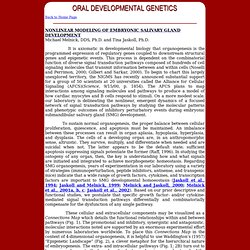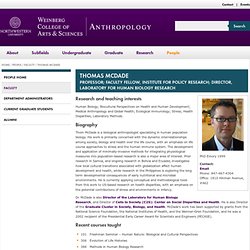

Epigenetic+landscape.jpg (JPEG Image, 890 × 320 pixels) Oral Developmental Genetics - Tina Jaskoll, Ph.D & Michael Melnick, DDS, Ph.D. Back to Home Page Nonlinear modeling of Embryonic Salivary Gland DevelopmentMichael Melnick, DDS, Ph.D. and Tina Jaskoll, Ph.D.

It is axiomatic in developmental biology that organogenesis is the programmed expression of regulatory genes coupled to downstream structural genes and epigenetic events. This process is dependent on the combinatorial function of diverse signal transduction pathways composed of hundreds of cell signaling molecules that transmit information between and within cells (Noselli and Perrimon, 2000; Gilbert and Sarkar, 2000). To begin to chart this largely unexplored territory, the NIGMS has recently announced substantial support for a group of 50 scientists at 20 universities called the Alliance for Cellular Signaling (AFCS)(Science, 9/15/00, p. 1854).
The AFCS plans to map interactions among signaling molecules and pathways to produce a model of how cardiac myocytes and B cells respond to stimuli. Probabilistic Neural Network Analysis. Conrad Hal Waddington. Conrad Hal Waddington CBE FRS FRSE (8 November 1905–26 September 1975) was a British developmental biologist, paleontologist, geneticist, embryologist and philosopher who laid the foundations for systems biology.

He had wide interests that included poetry and painting, as well as left-wing political leanings. In his book The Scientific Attitude (1941), he touched on political topics such as central planning and praised marxism as a "profound scientific philosophy". Life[edit] Waddington, known as "Wad" to his friends and "Con" to family, was born to Hal and Mary Ellen (Warner) Waddington, 8 November 1905. Until nearly three years of age, Waddington lived with his parents in India, where his father worked on a tea estate in the Wayanad district.
He attended Clifton College and Sidney Sussex College, Cambridge. During World War II he was involved in operational research with the Royal Air Force and became scientific advisor to the Commander in Chief of Coastal Command from 1944 to 1945. Figure 3 : Conrad Hal Waddington: the last Renaissance biologist? : Nature Reviews Genetics. Thomas McDade: Anthropology - Northwestern University.
Research and teaching interests Human Biology; Biocultural Perspectives on Health and Human Development; Medical Anthropology and Global Health; Ecological immunology; Stress; Health Disparities; Laboratory Methods.

Biography Thom McDade is a biological anthropologist specializing in human population biology. His work is primarily concerned with the dynamic interrelationships among society, biology and health over the life course, with an emphasis on life course approaches to stress and the human immune system. The development and application of minimally-invasive methods for integrating physiological measures into population-based research is also a major area of interest. Dr. Recent courses taught Select publications, presentations and conferences Download a complete CV. 2013 McDade, T.W., Hoke, M., Borja, J.B., Adair, L.S., and C. 2012 McDade, T.W. Libraries - Basic Record. Libraries - Basic Record.
International Darwin Day Foundation. Richard Dawkins Foundation for Reason & Science. Epi(c)genetics in conifers! Since the onset of genetic studies, scientists have noticed that classical Mendelian mechanisms alone could not explain the phenotypic patterns observed in living organisms. Waddington coined the word epigenetics in 1942 while studying how gene expression patterns are modified during differentiation and development.
Here is the mental picture he had in mind: The upper surface is the phenotypic landscape. The anchored pegs symbolize genes, and strings pulling the landscape are genetic interactions that shape the phenotypic landscape. (Source: openi.nlm.nih.gov) Waddington’s successors brought great improvement in the understanding of epigenetic mechanisms during the last century. In parallel to developmental studies, epigenetics has been extensively studied by evolutionary biologists as a mechanism of transgenerational non-genetic determination of phenotypes. Have you ever thought that a microscopic animal could be cooler than X-men? A Norway spruce cone. References Agrawal, A.